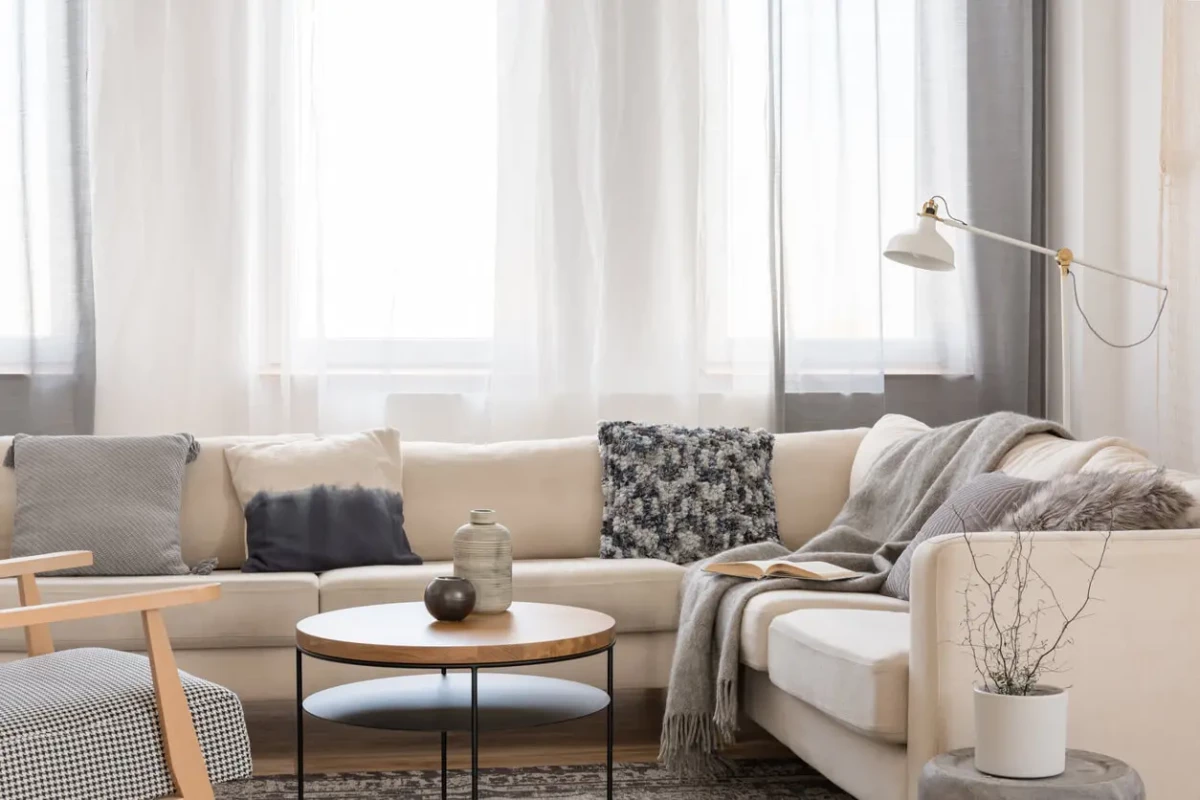Furnished rental management: regulations, taxation and practical advice

La gestion locative meublé connaît un essor important auprès des propriétaires. Définissons de quoi s'agit-il d'abord ? En effet, la gestion locative meublée est un type d'investissement locatif qui concerne les logements déjà dotés de meubles. Elle est notamment encadrée par la loi du 6 juillet 1989. La réglementation exige notamment que le logement mis en location doit garantir confort et sécurité aux occupants. Ce qui signifie qu'il doit être doté d'un certain nombre d'équipements.
Regarding the management of a furnished property , it can be done by yourself or entrusted to an agency or a specialized company. If you also want to get started in furnished investment, find out about the regulations and taxation in this article.
What is furnished rental management?
Furnished rental management is an increasingly popular real estate investment solution. It offers an interesting alternative to unfurnished rental. It involves renting a property equipped with furniture. This form of rental management has important specificities.
Functioning
Equipped rental management applies to furnished apartments . It consists of renting out accommodation ready to be occupied. The accommodation must have sufficient furniture. This furniture allows normal occupation by the tenant.
Furnished rental management encompasses several aspects. It includes the search for new occupants. It includes the drafting of the contract. It also includes the collection of rents and the maintenance of the accommodation.
Differences between furnished and traditional rental management
Furnished rental management has particularities that distinguish it from traditional management. These differences concern in particular the duration of leases, the inventory of fixtures and the management of tenants.
In furnished accommodation, the standard lease lasts one year and is automatically renewed. Conversely, in a traditional situation, the minimum period is three years. This difference gives equipped rental management a flexibility that some owners appreciate.
Rents for furnished rentals are often higher than for traditional management. This reflects the additional comfort provided by the furniture and the often temporary nature of this type.
The inventory is also more detailed in furnished accommodation. It includes a precise inventory of the furniture and equipment present in the accommodation. This step is essential to prevent any dispute at the end of the contract.
Finally, tenant management differs depending on the type of rental. In furnished accommodation, occupants are often temporary, which implies a more frequent turnover of occupants. Renting with furniture therefore requires increased availability, but it presents interesting financial advantages for owners.
Regulations and legal obligations for furnished rentals
It is governed by precise rules aimed at protecting both the tenant and the landlord .
Lessor's obligations
The lessor must respect a strict legal framework to guarantee rental conditions that comply with the requirements of the law.
The lease agreement is the first essential document. It must comply with the model provided by the ALUR law and specify the specific conditions of the rental with equipment: duration, amount of rent, security deposit and list of equipment provided. This document must also mention the rights and duties of the tenant.
Be aware that the equipment that must be present in a furnished house or apartment is cited by the ALUR law . Indeed, the property must contain functional and comfortable elements. To rent furnished, your accommodation must therefore be equipped with bedding with a duvet or blanket. It must also be equipped with hotplates and a refrigerator. A table and chairs are also required in this type of rental, without forgetting kitchen utensils and lighting. These materials must not only be present. They must also be in good condition when the tenant moves in.
In addition to these facilities, the regulations in force also require the subscription of non-occupying owner home insurance (PNO) . Furnished rentals can be exposed to various hazards. Fortunately, this allows you to benefit from coverage against risks. This may be damage caused by claims affecting third parties or caused by the tenant.
By complying with these requirements, rental compliance is ensured, which reduces the risk of disputes with tenants.
Regarding rents
If you are considering estimating rents , you must also comply with the regulations in force. This is particularly true if you are in areas subject to rent controls. This is particularly the case if your rental property is located in cities such as Paris or Lyon. Find out about the prefectural decree on legal values. Outside of regulated areas, the rent can be set more freely. However, make sure that your price is close to local rental market prices.
The security deposit for a furnished rental is legally regulated. It corresponds to two months' rent excluding charges, compared to one month for an unfurnished rental. This amount guarantees coverage for any damage or non-payment. In addition, you can request a joint and several surety to further secure the rental, particularly in the case of a tenant profile deemed to be at risk.
Complying with these regulations helps ensure a fair rental and limits conflicts related to rent or requested guarantees.
Duration and types of furnished rental leases
Furnished rentals guarantee great flexibility thanks to leases adapted to the varied needs of tenants and owners.
The classic furnished lease lasts for one year, automatically renewable upon expiry. This type of rental provides stability to occupants looking for a long-term rental. If necessary, they can benefit from a reduced notice period of one month, thus offering a certain flexibility.
The student lease , designed for students in higher education, is concluded for a period of nine months. This period generally corresponds to one academic year. Unlike the classic lease, it is not tacitly renewable, which allows owners to recover their accommodation at the end of the agreed period. It is ideal for optimizing the occupancy of furnished accommodation by targeting a specific and regular audience.
These options make it possible to adapt furnished rental to different profiles while maximizing profitability for the owner.
Conflict management and end of lease
In furnished rentals, conflicts require rigorous management to avoid complications.
The exit inventory is an important step. This document allows you to compare the condition of the accommodation between the tenant's entry and exit. In the event of any damage or non-payment, the owner is entitled to withhold the security deposit. In addition to these cases, you must return the security deposit to the tenant within one month of receiving the keys. If a dispute arises in this area, the tenant can initiate legal proceedings or refer the matter to the Conciliation Commission.
On the landlord's side, he can also initiate certain procedures in the event of non-payment. You can take progressive action, for example by sending reminder letters. After that, you can activate caution or resort to an eviction procedure.
Rental management agencies or companies often offer support in these situations.
By anticipating disputes and relying on professionals, you ensure effective management, even in the face of conflicts.
Taxation and status of furnished rental
Furnished rentals offer interesting tax opportunities for owners, depending on their status and the tax conditions chosen.
Tax status of furnished rental
When you rent furnished accommodation, you are either subject to LMNP status or LMP status. This depends on your earnings.
The Non-Professional Furnished Rental status applies by default if your rental income does not exceed €23,000 per year. With this status, your earnings are taxed in the Industrial and Commercial Profits (BIC) category. You also benefit from a VAT exemption, unless the property is a service residence.
Two types of taxation are possible for the LMNP . The Micro-BIC ensures a flat-rate deduction of 50% on the amounts received. The actual regime, for its part, allows you to deduct expenses and depreciate the asset, thus reducing the taxable base.
The Professional Furnished Rental (LMP) status applies if your earnings exceed €23,000 per year and represent more than 50% of your tax household. Your earnings are also taxed in the BIC category, but with social security contributions to be expected.
As with the LMNP, the actual system allows you to deduct expenses and depreciate your property. This considerably reduces your taxable base. In addition, if you sell the property, you can benefit from a partial or total exemption from professional capital gains. This exemption depends on the holding period and the level of rent received.
The choice between LMNP and LMP depends on your tax and asset objectives. Each status has specific advantages to be analyzed according to your personal situation.
Tax system and optimization of rental income
Choosing the right tax method is essential to optimizing profitability and reducing your tax burden.
The micro-BIC applies automatically if your annual rental income does not exceed €77,700. It guarantees a flat-rate deduction of 50%, but you cannot deduct your actual expenses. It is simple and practical, ideal for owners with few deductible expenses.
The actual system , mandatory for incomes above €77,700, remains optional if you are below this threshold. It allows you to deduct all expenses related to your furnished rental management.
Among the deductible expenses , we can cite maintenance costs, loan interest, taxes and even insurance . In addition, the property is depreciable. This reduces the taxable base.
In this type of investment, your profits are considered Industrial and Commercial Profits or BIC. As for the tax rates, these depend on your LMNP or LMP status.
If you choose the actual system, compliance with accounting obligations is required. This means that you must make an annual declaration or even draw up an accounting balance sheet.
In all, secure your investment and maximize profitability by focusing on the best tax method . Also remember to anticipate your reporting procedures.
The tax advantages of furnished rental management
There are many advantages to furnished rental management . Among these is real estate depreciation. This refers to a mechanism that allows the purchase price of the furnished property to be spread over several years.
Therefore, two cases may arise. You are subject to the actual system: you benefit from depreciation of up to 85% of the value of the property and furniture.
Tax deductions are also very interesting. Management fees, whether related to an agency or a manager, are fully deductible. You can also deduct expenses such as loan interest or work carried out in the home.
For serviced residence properties , such as student or senior housing, you have the possibility of recovering the VAT on the initial investment. In addition, under certain conditions, rents can be exempt from VAT, thus increasing profitability.
By combining these tax advantages with good management, you reduce your taxes while increasing your income. Using an expert or a specialized manager allows you to maximize these benefits and secure your investment.
Tips for effective furnished rental management
Successful rental management with equipment requires organization, legal and tax knowledge, as well as rigorous monitoring. Outsourcing this management can be an ideal solution to guarantee peace of mind and profitability.
Delegate rental management
If you do not have time to manage the rental or if you are looking to optimize the profitability of your property, we advise you to put it under delegated management.
The aim of the approach is to entrust the management to a property manager . The solution allows you to save time and ensure compliance with legal requirements. These experts take care of all the key steps. This ranges from finding serious tenants to drafting leases. They also manage payments and monitor any disputes. They also take care of administrative procedures, such as inventory and the return of security deposits.
Using a property manager or rental management officer reduces the risk of legal or tax errors. It also ensures that you receive tailored support. This service is ideal if you live far from your property or if you own several rentals. By outsourcing, you benefit from professional management , without the operational constraints of everyday life.
Why choose WeManage?
NousGérons is a trusted partner for owners looking for a rental management mandate . With recognized expertise, this company offers you complete support. Our services include rental, daily rental management and administrative and legal monitoring. Our team also supports you in tax optimization and maximizing your profits.
By choosing NousGérons, you benefit from a simple and intuitive online platform . It allows you to track payments, expenses and the performance of your property in real time. This transparency gives you total visibility on the management of your accommodation.
With NousGérons, opt for a turnkey solution that combines profitability and peace of mind. Entrust your property to experts and focus on what really matters.
What you need to remember
Furnished rental management combines legal and tax advantages, suitable for owners wishing to maximize their income. However, this type of rental involves specific legal and administrative duties .
Using a specialized manager like NousGérons ensures optimal management, without the daily constraints. Their expertise, combined with their online platform, guarantees rigorous monitoring and peace of mind for owners.
To take advantage of the benefits of renting with equipment, contact NousGérons now. Their team will support you every step of the way to secure your earnings and enhance the value of your property.
These articles may also be of interest to you
-

Le taux d’emprunt pour une SCI sur 15 ans dépend du profil des associés, du montage choisi et des conditions bancaires. En 2025, les taux moyens tournent autour de 3,55 % à 3,75 %, avec des écarts importants selon les dossiers. Pour obtenir les meilleurs taux, il faut comparer, optimiser son dossier et surveiller les évolutions mensuelles du marché.
-

Le régime réel en LMNP est une stratégie fiscale puissante qui permet de déduire l'ensemble des charges réelles et d'amortir le bien immobilier, réduisant ainsi fortement l'impôt sur les revenus locatifs. Ce régime, souvent plus avantageux que le Micro-BIC si vos charges sont élevées, peut même générer un déficit reportable pour annuler l'impôt pendant plusieurs années.
-

L'investissement locatif reste un moyen sûr de bâtir son patrimoine. Pour qu'un projet réussisse, une stratégie complète est nécessaire, de l'acquisition à la gestion. Face à cette complexité, bien choisir son agence clé en main est important. Investissement-Locatif.com se démarque comme référence, offrant un service intégré depuis 12 ans, de la recherche aux travaux et à la gestion, assurant des projets optimisés et une rentabilité durable pour tout type d'investisseur.




